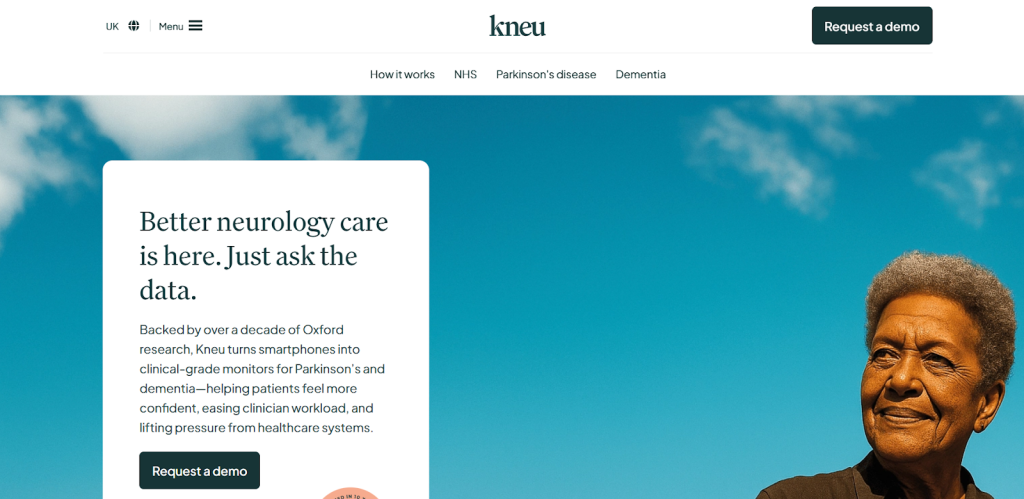Kneu Health Raises $5.6 Million Seed Round to Revolutionize Neurological Care Through Everyday Devices
October 16, 2025
byFenoms Start-Up Research

Kneu Health, an Oxford-born digital health startup, has raised $5.6 million in seed funding to redefine how Parkinson’s disease and dementia are monitored and managed. The round drew participation from Oxford Science Enterprises, Cedars-Sinai, Social Impact Enterprises, JIMCO (Jameel Investment Management Co.), and G.K. Goh Ventures, with additional backing from SXSW London.
Led by CEO Caroline Cake, former head of Health Data Research UK, Kneu Health is building a new kind of clinical-grade monitoring system that transforms smartphones into powerful neurological assessment tools. By capturing subtle motion, speech, and behavioral patterns, Kneu enables clinicians to detect disease progression earlier, tailor treatment more precisely, and free up clinical capacity across overstretched health systems.
Turning Data Into a Neurological Lifeline
At its core, Kneu Health’s vision is simple but transformative: use data-driven insights from everyday devices to make neurology more continuous, personalized, and equitable. The platform leverages over a decade of Oxford research to convert passive smartphone interactions into validated neurological biomarkers. For patients with Parkinson’s or dementia, this means real-time tracking of tremors, speech changes, and movement patterns - all without the need for in-person clinic visits or expensive hardware.
This innovation arrives at a crucial moment. Global neurological disorders affect more than a billion people, with costs spiraling as populations age. Traditional assessment models, which rely on episodic clinical appointments, fail to capture the subtle day-to-day fluctuations that define these conditions. Kneu’s model bridges that gap, turning a smartphone into a living clinical instrument capable of continuous measurement.
The Power of Precision in Everyday Context
By anchoring neurological monitoring in the fabric of daily life, Kneu is tackling one of healthcare’s biggest data gaps - the disconnect between what happens in the clinic and what happens at home. Using AI and advanced signal processing, the platform contextualizes each patient’s digital footprint to identify clinically relevant changes long before they manifest physically.
For healthcare systems, the implications are profound. Continuous, real-world monitoring allows clinicians to intervene earlier, optimize medication schedules, and reduce avoidable hospitalizations. For patients, it restores agency - shifting neurology from reactive care to proactive empowerment.
But beneath the technology lies something even more instructive for founders in any industry. The success of Kneu’s raise is not just about the elegance of its AI, but about how precisely it aligns innovation with systemic pain points.
Here lies a crucial founder insight - the ultra value drop that defines why Kneu stands out. The most scalable startups don’t chase emerging technologies; they engineer them to solve unsexy, persistent inefficiencies in established systems. Kneu didn’t set out to make “AI for healthcare.” It targeted a very specific bottleneck: the lag between neurological symptom onset and data-driven response. By owning that friction point and proving measurable impact in clinical workflows, Kneu earned both credibility and capital.
Too often, founders pursue broad disruption and end up fighting inertia. What Kneu shows is that systemic adoption happens when innovation fits neatly into existing infrastructure, not when it demands a revolution. Investors fund what integrates, not what intimidates - and that’s a lesson with compounding value across industries.
From Oxford Research to Global Health Systems
Kneu Health’s origins are deeply rooted in academic excellence and translational science. Its technology draws from over ten years of research at the University of Oxford, blending neuroscience, data science, and behavioral analytics. Now, with backing from global institutions like Cedars-Sinai and Oxford Science Enterprises, the company is poised to expand its reach across both the UK’s NHS and international healthcare markets.
CEO Caroline Cake emphasized that the raise will be used to accelerate product validation, expand clinical partnerships, and scale deployment across multiple neurological conditions. The company also aims to integrate its platform with electronic health record systems, enabling seamless collaboration between clinicians and patients.
Investors Backing a New Model for Healthcare Efficiency
The participation of impact-focused investors like JIMCO and Social Impact Enterprises reflects a growing trend: capital moving toward technologies that blend clinical rigor with measurable public benefit. Unlike consumer health apps, Kneu’s platform sits firmly in the regulated medical device space - designed to meet the standards required for real-world healthcare adoption.
Investors view this approach as a hedge against the volatility of consumer health tech, offering instead a foundation for sustained impact and defensible intellectual property. The blend of clinical validation and global scalability makes Kneu a compelling candidate for long-term value creation in digital health.
Redefining What “Clinical-Grade” Really Means
As healthcare systems continue to face staffing shortages and diagnostic bottlenecks, tools that expand clinician reach without adding burden are becoming mission-critical. Kneu Health’s model doesn’t replace medical expertise - it amplifies it through precision data and automation. This is the future of “augmented medicine,” where the best doctors are not just skilled, but superpowered by data.
In many ways, Kneu’s $5.6 million seed raise is less about early-stage funding and more about setting a benchmark for how deep-tech health startups should scale: grounded in evidence, focused on outcomes, and unafraid to solve the slow problems others ignore.
The message for founders? Build where inefficiency hides, measure where others guess, and integrate where others disrupt. That’s not just how you raise capital - it’s how you redefine an industry.









